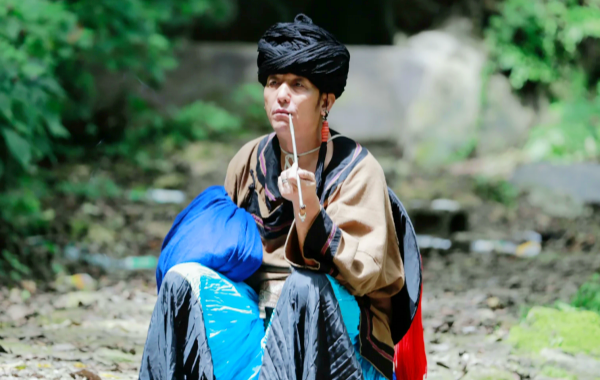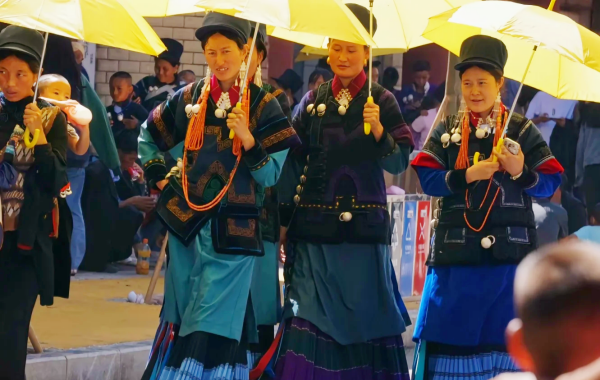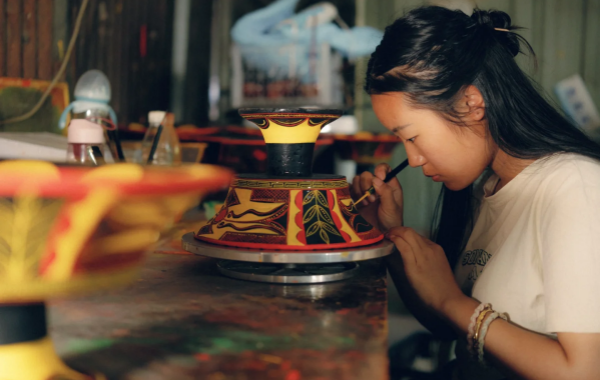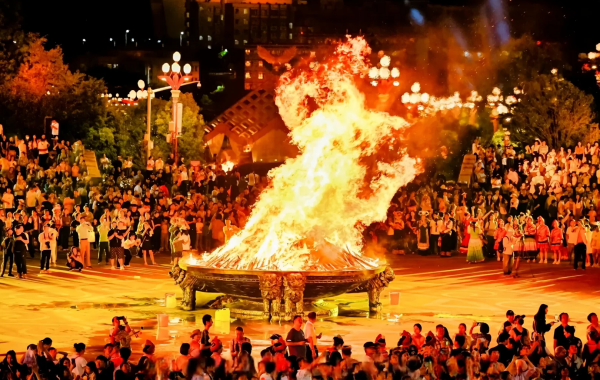Yi
Introduction

The Yi Nationality is one of the largest ethnic minorities in China, known for its rich and diverse culture, unique language, and long - standing history. Living in the mountainous and plateau regions of southwestern China, the Yi people have developed a distinct way of life that is closely related to the natural environment and their traditional beliefs.
 History
History
· Origin
The Yi people are believed to have descended from ancient tribes that inhabited the southwestern regions of China. Over thousands of years, they gradually formed their own ethnic identity through a process of migration, integration, and cultural development.
· Development
During different historical dynasties, the Yi areas had various forms of local governance. In some periods, they had their own chieftains and independent political entities. The Yi society had a well - developed hierarchical structure, with nobles, commoners, and slaves in different social strata. Trade and cultural exchanges with neighboring ethnic groups also took place, enriching the Yi culture.
· Modern Times
In modern times, especially after the founding of the People's Republic of China, the Yi people have experienced significant social and economic changes. The government has implemented a series of policies to promote ethnic equality, unity, and development. The Yi areas have witnessed rapid progress in education, healthcare, infrastructure construction, and economic development, while also striving to preserve their unique cultural traditions.
 Population
Population
· Quantity
As of the latest census data, the Yi population in China is approximately 9.8 million, making it one of the most populous ethnic minorities in the country.
· Distribution
The Yi people are mainly concentrated in Yunnan, Sichuan, Guizhou, and Guangxi Zhuang Autonomous Region. Yunnan Province has the largest Yi population, accounting for more than half of the total. Their habitats are mostly mountainous areas and plateaus, which have shaped their unique agricultural and living patterns.
 Economy
Economy
Traditionally, the Yi economy was based on agriculture, with the cultivation of crops such as corn, buckwheat, and potatoes. Animal husbandry, especially the raising of pigs, sheep, and horses, also played an important role. In addition, the Yi people were engaged in handicrafts, such as weaving, pottery - making, and silver - smithing. In modern times, with the development of the market economy, the Yi areas have gradually diversified their economic structure. Agriculture has become more modernized, and industries such as tourism, mining, and processing have emerged, providing more employment opportunities and improving the living standards of the Yi people.
 Culture
Culture
Language and Script
The Yi language belongs to the Tibeto - Burman branch of the Sino - Tibetan language family. It has several dialects. The Yi people also have their own written script, known as the Yi script. The Yi script has a long history and is one of the few indigenous written scripts in China that is still in use today. It is used for recording traditional literature, religious texts, and historical events. In recent years, efforts have been made to promote the use of the Yi language and script in education and cultural activities to preserve this valuable cultural heritage.
· Religious Beliefs
Polytheism and ancestor worship are the core of Yi religious beliefs. The Yi people believe in a variety of gods, including nature gods (such as the sun, moon, mountains, and rivers), household gods, and ancestral spirits. Shamans play an important role in religious rituals, acting as intermediaries between the human world and the spirit world. They perform ceremonies to pray for good harvests, health, and protection for the community. In addition, Buddhism and Taoism have also had some influence on the Yi religious culture, especially in some areas where temples and monasteries can be found.
 · Clothing
· Clothing
Traditional Yi clothing is colorful and distinctive, reflecting the ethnic characteristics and regional differences. Men usually wear short - sleeved or long - sleeved shirts with wide trousers. They may also wear a cloak made of sheepskin or felt, which is both practical and decorative. Women's clothing is more elaborate, often consisting of a long - sleeved blouse, a long skirt, and an apron. The clothing is usually adorned with colorful embroidery, silver ornaments, and beads, which showcase the Yi women's excellent craftsmanship and aesthetic sense. Different Yi branches have their own unique styles of clothing, which are an important part of their cultural identity.
· Literature
Yi literature has a rich oral tradition, including myths, legends, folk tales, and epic poems. These oral works have been passed down from generation to generation, reflecting the Yi people's views on the origin of the world, the creation of humanity, and their historical experiences. The most famous Yi epic is the "Mao Nian," which tells the story of the hero Mao Nian's struggles against evil forces and his efforts to unite the Yi people. In addition, there are also many written literary works in the Yi script, such as historical records, religious texts, and poems, which provide valuable materials for studying Yi history and culture.
· Architecture
Traditional Yi architecture is mainly represented by the "tuoke house" (a kind of wooden - structured house). These houses are usually built on sloping hillsides, using local materials such as wood, stone, and earth. The tuoke house has a unique structure, with a large eaves to protect against the rain and sun, and a fireplace in the center of the living room for heating and cooking. The interior is divided into several rooms for different purposes, such as sleeping, storage, and receiving guests. In some areas, Yi people also live in stone houses or cave dwellings, which are adapted to the local geographical environment.
 Science
Science
· Medicine
Traditional Yi medicine has a long history and is based on the theory of the balance of the five elements (wood, fire, earth, metal, and water) and the concept of yin and yang. Yi doctors use a combination of herbal medicine, acupuncture, massage, and spiritual healing methods to treat diseases. They have a deep understanding of the medicinal properties of local plants and animals and have accumulated rich experience in treating various ailments. In recent years, there has been increasing attention on the integration of traditional Yi medicine with modern medicine to provide more comprehensive and effective healthcare services for the Yi people.
· Calendar
The Yi people have their own traditional calendar, known as the "Suni Calendar." It is a lunisolar calendar that takes into account the movements of the sun and the moon. The Suni Calendar is used to guide agricultural activities, determine the dates of festivals, and mark important life events. It reflects the Yi people's close observation of nature and their deep understanding of astronomical phenomena.
 Art
Art
· Music
Yi music is characterized by its unique melodies and rhythms, often accompanied by traditional musical instruments such as the "yueqin" (a plucked string instrument), the "khene" (a mouth organ), and drums. Yi songs cover a wide range of themes, including love, labor, history, and nature. The lyrics are usually in the Yi language, expressing the people's emotions and thoughts in a vivid and touching way. Yi music is an important part of their cultural life and is often performed during festivals, weddings, and other celebrations.
· Dance
Yi dance is lively and energetic, with movements that mimic the actions of animals, the flow of rivers, and the growth of plants. Traditional Yi dances include the "Tiaoyue" (a kind of group dance), the "Left - foot Dance," and the "War Dance." These dances are often performed during festivals and important social events, bringing people together and creating a joyful and harmonious atmosphere. Dancers wear colorful costumes and use props such as swords, shields, and fans to enhance the performance.
 · Arts and Crafts
· Arts and Crafts
Yi arts and crafts are renowned for their exquisite craftsmanship and unique artistic styles. Traditional Yi crafts include silver - smithing, embroidery, wood - carving, and pottery - making. Yi silver ornaments are especially famous, with intricate designs and patterns that symbolize good luck, prosperity, and happiness. Embroidery is another important craft, with women using colorful threads to create beautiful patterns on clothing, blankets, and wall hangings. Wood - carving and pottery - making also have a long history, with products that are both practical and artistic.
 Custom
Custom
· Etiquette
Yi etiquette is based on respect, hospitality, and politeness. When greeting others, the Yi people usually shake hands or nod slightly. In social interactions, they pay attention to seniority and status, showing respect to elders and guests. When visiting an Yi home, guests are often offered tea, wine, and food as a sign of welcome. It is considered impolite to refuse these offerings or to enter the host's bedroom without permission.
· Marriage Customs
Yi marriage customs vary among different branches and regions, but generally involve several stages, including courtship, engagement, and wedding ceremonies. In the past, arranged marriages were common, but now young people have more freedom to choose their partners. The wedding ceremony is an important event in Yi society, usually lasting for several days. It includes rituals such as exchanging gifts, drinking cross - cupped wine, and singing and dancing. After the wedding, the newlyweds may live with the groom's family or set up their own household.
 · Festivals
· Festivals
The Yi people celebrate many festivals throughout the year, each with its own unique customs and meanings. The Torch Festival is one of the most important and well - known Yi festivals. It is usually held in June or July of the lunar calendar and lasts for three days. During the festival, people light torches and walk around the villages and fields, believing that the fire can drive away evil spirits and bring good luck and a bumper harvest. Other festivals include the Spring Festival (Chinese New Year), the Dragon Boat Festival, and the Mid - Autumn Festival, which are also celebrated with great enthusiasm and various traditional activities.
· Diet
Yi cuisine is mainly based on local agricultural products and livestock. Staple foods include corn, buckwheat, and potatoes. Meat dishes often feature pork, beef, and mutton, which are usually cooked in stews or roasted over an open fire. The Yi people also like to eat sour and spicy food, and they make various pickles and chili sauces to add flavor to their meals. In addition, they have a tradition of drinking "suantang" (a kind of sour soup), which is believed to be good for digestion and health.
· Funeral Customs
Yi funeral customs are based on the belief in an afterlife and the importance of ancestor worship. When a person dies, the body is usually washed, dressed in new clothes, and placed in a coffin. Funeral rituals are performed by shamans or elders, who pray for the soul of the deceased to have a peaceful journey to the afterlife. Family and friends gather to pay their respects and offer condolences. The mourning period varies depending on the region and the status of the deceased, during which time relatives and friends may bring food and gifts to the family of the deceased.
What Our Clients Say?
Based on 10,000+ traveler reviews











